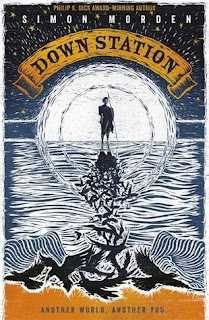Down Station - Review
Part of the problem I've always had with Star Wars: Episode I is its inability to live up to its potential. It'd be easy to love or hate a film that's entirely awesome or terrible, but dealing with one which lies somewhere in the middle is a little tougher. The trailers and marketing made it seem like a spellbinding sojourn into the prehistory of popular culture's most beloved space opera franchise, showing a vibrant world before Darth Vader's Empire. Then the final film came out, and all those gorgeous visuals and intriguing characters were wasted, not given the space they needed to develop into something iconic or matching the potential implied by the trailers. Whatever else you could call it, Episode I was, in every sense of the word, a letdown.
I could say the same of Down Station, a quasi-modern-day fantasy with a premise that's almost entirely squandered on lacking characters and a wafer-thin plot. It's a shame, because the book's premise and opening chapters left me excited; in practice, like Episode I, it fails to live up to its potential.
A freak firestorm causes London Underground workers Mary, Dalip and Stanislav, along with several of their cohort, to flee through a door in the subway tunnels of Britain. The door sends them to a strange and seemingly deserted shore with an unfamiliar sky, leaving no means of getting back. After trying to discern where they've ended up, several of the survivors, including Dalip and Stanislav are captured by a geomancer and her wolf-man enforcer; the geomancer wants to know which London they've come from, and why they're here. At the same time, Mary is taken in by resident enigma Crows, a man who's seemingly lived in these parts for a long time and has a personal beef with the geomancer. He wants Mary's help in bringing the geomancer down, and subtly guides her in the ways of a strange new form of magic.
Did that paragraph sound a tad confusing? If so, then you're beginning to get a good idea of why I didn't enjoy Down Station.
I want to say up front that I didn't detest the book with the same passionate intensity I reserve for recent efforts like Swords and Scoundrels. It's abundantly clear that Simon Morden is a talented writer, even if the story's not up to scratch; the prose, when given clarity, is quite well done, and the initial plot hook carries a lot of potential. Unfortunately, that potential is never reached.
At its basest level, Down Station fails because I felt utterly disconnected from the characters. Mary, Dalip and Stanislav - being the only members of the tunnel gang given anything resembling proper characterisation - are one-note and uninteresting, relying on tired traits that don't actually register them as people. Mary is stand-offish and a former criminal who swears a lot; Dalip is a naive young man progressing into adulthood; Stanislav is a gruff Eastern European war survivor who relishes violence. Every detail of the protagonists is surface level, despite meager attempts to get below that surface with hints to their lives before.
Not caring about your heroes is a problem when the plot is as tenuous and bland as it is here. The initial entry to the fantasy world, when the tunnel gang escape from a burning London, provokes intrigue that is never fully realised or paid off. The mystery of the strange island gives way to imprisonment and uprising within an enemy stronghold (for Dalip and Stanislav), and nascent training in the arts of weird magic that attempts to act as the first step of a bildungsroman (for Mary). Both plots put paid to any sense of worldbuilding, and since they rely instead on the building of tension and the breakthrough of barriers - being escape from prison and mastering magic, respectively - they are hamstrung by the aforementioned uninteresting characters. What's the big deal with Mary realising she can be free through magic, when I don't have a good sense of her figurative imprisonment to begin with? Why should I care that Dalip and Stanislav are making slow progress in training to escape from the geomancer, when I don't actually care about them as people? On that note, why should I believe the geomancer is as evil and wretched a villain as the book's characters claim she is, when she has a grand total of maybe three or four scenes and doesn't do much of note with herself?
What it all really boils down to is that I didn't care. Down Station did not make me care about its characters or its plot. The triumphant payoff to each character's arc feels more like ticking a box on the "elements of the hero's journey" checklist, rather than anything meaningful or cathartic. The resolution (if one can call it that) leaves the door open for a sequel, though I can safely say I won't be back for it if the level of failed potential on display here is present in future installments. Some might say I'm being a bit unfair to the first book of a series, and that perhaps the next book might learn from this one's mistakes to make things more engaging. To that, I'd say there are series whose first books made me care about characters far faster than Down Station did; examples like Lian Hearn's Across the Nightingale Floor and Jim Butcher's Storm Front come to mind.
There's not much more I can say about Down Station without delving into repetition, since there's not much else that caught my attention. As I said at the beginning, this isn't a bad book the way Swords and Scoundrels was, but it definitely isn't one I'd recommend to casual readers. In many ways, the books that aren't outright terrible or joyously marvelous are harder to write about, and that makes me dislike it even more. Down Station is competent in its writing yet uninteresting in its content, a thoroughly mediocre book that fails to register.
- Chris
I could say the same of Down Station, a quasi-modern-day fantasy with a premise that's almost entirely squandered on lacking characters and a wafer-thin plot. It's a shame, because the book's premise and opening chapters left me excited; in practice, like Episode I, it fails to live up to its potential.
A freak firestorm causes London Underground workers Mary, Dalip and Stanislav, along with several of their cohort, to flee through a door in the subway tunnels of Britain. The door sends them to a strange and seemingly deserted shore with an unfamiliar sky, leaving no means of getting back. After trying to discern where they've ended up, several of the survivors, including Dalip and Stanislav are captured by a geomancer and her wolf-man enforcer; the geomancer wants to know which London they've come from, and why they're here. At the same time, Mary is taken in by resident enigma Crows, a man who's seemingly lived in these parts for a long time and has a personal beef with the geomancer. He wants Mary's help in bringing the geomancer down, and subtly guides her in the ways of a strange new form of magic.
Did that paragraph sound a tad confusing? If so, then you're beginning to get a good idea of why I didn't enjoy Down Station.
I want to say up front that I didn't detest the book with the same passionate intensity I reserve for recent efforts like Swords and Scoundrels. It's abundantly clear that Simon Morden is a talented writer, even if the story's not up to scratch; the prose, when given clarity, is quite well done, and the initial plot hook carries a lot of potential. Unfortunately, that potential is never reached.
At its basest level, Down Station fails because I felt utterly disconnected from the characters. Mary, Dalip and Stanislav - being the only members of the tunnel gang given anything resembling proper characterisation - are one-note and uninteresting, relying on tired traits that don't actually register them as people. Mary is stand-offish and a former criminal who swears a lot; Dalip is a naive young man progressing into adulthood; Stanislav is a gruff Eastern European war survivor who relishes violence. Every detail of the protagonists is surface level, despite meager attempts to get below that surface with hints to their lives before.
Not caring about your heroes is a problem when the plot is as tenuous and bland as it is here. The initial entry to the fantasy world, when the tunnel gang escape from a burning London, provokes intrigue that is never fully realised or paid off. The mystery of the strange island gives way to imprisonment and uprising within an enemy stronghold (for Dalip and Stanislav), and nascent training in the arts of weird magic that attempts to act as the first step of a bildungsroman (for Mary). Both plots put paid to any sense of worldbuilding, and since they rely instead on the building of tension and the breakthrough of barriers - being escape from prison and mastering magic, respectively - they are hamstrung by the aforementioned uninteresting characters. What's the big deal with Mary realising she can be free through magic, when I don't have a good sense of her figurative imprisonment to begin with? Why should I care that Dalip and Stanislav are making slow progress in training to escape from the geomancer, when I don't actually care about them as people? On that note, why should I believe the geomancer is as evil and wretched a villain as the book's characters claim she is, when she has a grand total of maybe three or four scenes and doesn't do much of note with herself?
What it all really boils down to is that I didn't care. Down Station did not make me care about its characters or its plot. The triumphant payoff to each character's arc feels more like ticking a box on the "elements of the hero's journey" checklist, rather than anything meaningful or cathartic. The resolution (if one can call it that) leaves the door open for a sequel, though I can safely say I won't be back for it if the level of failed potential on display here is present in future installments. Some might say I'm being a bit unfair to the first book of a series, and that perhaps the next book might learn from this one's mistakes to make things more engaging. To that, I'd say there are series whose first books made me care about characters far faster than Down Station did; examples like Lian Hearn's Across the Nightingale Floor and Jim Butcher's Storm Front come to mind.
There's not much more I can say about Down Station without delving into repetition, since there's not much else that caught my attention. As I said at the beginning, this isn't a bad book the way Swords and Scoundrels was, but it definitely isn't one I'd recommend to casual readers. In many ways, the books that aren't outright terrible or joyously marvelous are harder to write about, and that makes me dislike it even more. Down Station is competent in its writing yet uninteresting in its content, a thoroughly mediocre book that fails to register.
- Chris
Down Station is available in bookstores now.
Review copy kindly supplied to Geek of Oz by Hachette Australia.





Comments
Post a Comment
Thanks for taking the time to read and comment! Bill Murray says: YOU'RE AWESOME!